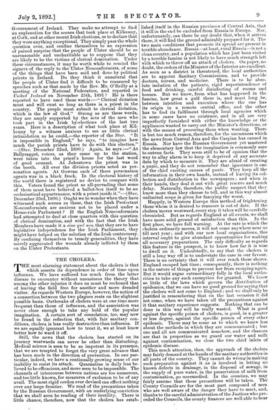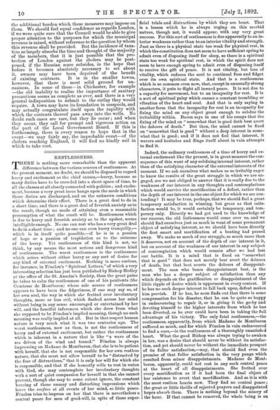THE CHOLERA.
Still, the news that the cholera has started on its journey westwards can never be other than disturbing. Medical science is seen to be so impotent in its presence, that we are tempted to forget the very great advance that has been made in the direction of prevention. In one par- ticular, indeed, we have a continually growing sense of our inability to resist its attack. Quarantine is daily less be- lieved to be efficacious, and more seen to be impossible. The channels of intercourse between nations are too numeroue, and too little known, for measures of exclusion to be of any avail. The most rigid cordon ever devised can effect nothing over any large frontier. We read of the precautions taken by the Russian Government, with an underlying conviction that we shall soon be reading of their inutility. There is little chance, therefore, now that the cholera has estab- lished itself in the Russian provinces of Central Asia, that it will in the end be excluded from Russia in Europe. Nor, unfortunately, can there be any doubt that, when it arrives there, it will find, the ground admirably prepared for it. The two main conditions that promote its spread are present in terrible abundance. Russia—at least, rural Russia—is not a clean country, and a population which has just been visited by a terrible famine is not likely to have much strength left with which to throw off an attack of cholera. On paper, no doubt, the orders of the Minister of the Interior are excellent. As soon as a district is threatened, the local authorities are to appoint Sanitary Commissions, and to provide doctors, nurses, and medicine. There is to be abso- lute isolation of the patients, rigid superintendence of food and drinking, careful disinfecting of rooms and houses. But we know, from what has happened in the famine, how great a gulf there is, and must long be, between intention and execution where the one has its origin in a remote central office, and the other has to find its fulfilment through local agencies which in some cases have no existence, and in all are very imperfectly furnished with either the knowledge or the appliances wanted to carry out the Minister's directions, or with the means of procuring them when wanting. There is but too much reason, therefore, for the uneasiness which the news from Central Asia and the Caspian has caused in Russia. Nor have the Russian Government yet mastered the elementary law that the imagination is commonly sure to outrun facts. They seem still to be of opinion that the way to allay alarm is to keep it deprived of any accurate data by which to measure it. They are afraid of creating a panic, and they do not remember that ignorance is one of the chief exciting causes of panic. They keep all the information in their own hands, instead of leaving its col- lection and distribution to the newspapers ; and when in their hands, they deal it out with great reserve and much delay. Naturally, therefore, the public suspect that they know more than they choose to tell, and in this way almost unlimited scope is given for fancying the worst. Happily, in Western Europe this method of frightening those whom it is desired to reassure is out of date. If the cholera 'moves westward, every step it takes will be carefully chronicled. But as regards England at all events, we shall have more solid ground of satisfaction than this. In the first place, we have full warning. At the rate in which the cholera ordinarily moves, it will not come anywhere near us till next year ; and with our new local organisations, this interval ought to give abundant opportunities for making all necessary preparations. The only difficulty as regards this feature in the prospect, is to know how far it is wise to dwell on it. Undoubtedly, to say that the cholera is still a long way off is to understate the case in our favour. There is no certainty that it will ever reach these shores. England escaped last time ; consequently, there is nothing in the nature of things to prevent her from escaping again. But it would argue extraordinary folly in the local autho- rities to take any such exemption for granted. We know so little of the laws which govern the distribution of epidemics, that we can have no good ground for saying that the cholera will not come to England ; and we shall only be justified in remembering that on the last occasion it did not come, when we have taken all the precautions against it that sanitary experience suggests. Nothing that can be done in this way will be really wasted. What is good against the specific poison of cholera, is good, in a greater or less degree, against the specific poison of every other epidemic. There may be some as to which we know less about the methods in which they are communicated ; but one and all are communicated somehow, and the chances are that in proportion as we guard our water and milk against contamination, we close the two chief inlets of epidemic disease. This much attention, then, the approach of the cholera may fairly demand at the hands of the sanitary authorities in all parts of the country. They cannot do wrong in making such preparation against it as is involved in letting no known defects in drainage, in the disposal of sewage, in the supply of pure water, in the preservation of milk from contamination, go unremedied. In the counties, we may fairly assume that these precautions will be taken. The County Councils are for the most part composed of men who are well aware of the danger they have to meet, and, thanks to the careful administration of the Justices who pre- ceded the Councils, the county finances are well able to bear the additional burden which these measures may impose on them. We should feel equal confidence as regards London, if we were quite sure that the Council would be able to give proper attention to the purposes for which the municipal revenue is raised, without reference to the question by whom this revenue shall be provided. But the incidence of taxa- tion so largely absorbs the time and thought of the majority of the members, that it is just possible that the pro- tection of London against the cholera may be post- poned, if the Russian scare subsides, in the hope that before it becomes absolutely necessary to set about it, owners may have been deprived of the benefit of existing contracts. It is in the smaller towns, however, that there is most solid ground for un- easiness. In some of these—in Chichester, for example —the old inability to realise the importance of sanitary precautions seems as complete as ever, and there is a very general indisposition to submit to the outlay they would require. A town may have its foundation in cesspools, and may actually congratulate itself upon the rapidity with which the contents thereof pass away into the wells. No doubt such cases are rare, but they do occur ; and when they occur, they call for prompt and vigorous action on the part of the Local Government Board. If this is forthcoming, there is every reason to hope that in the event—we may fairly say, the improbable event—of the cholera reaching England, it will find no kindly soil in which to take root.











































 Previous page
Previous page